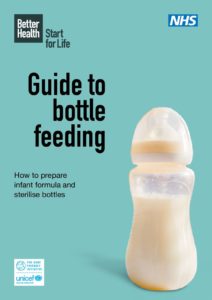Formula feeding
Correct preparation of powdered formula feeds
Powdered infant formula should never be prepared using cold water, as this increases your baby’s risk of serious infections. It is important to prepare feeds as per the instructions on the tin of powdered formula, using freshly boiled water that has been left to cool in the kettle for no longer than 30 minutes.
This is because the water must be hot enough to sterilise the powder (cans of powder are not sterile and may contain harmful bacteria). All equipment that comes into contact with infant formula should be sterilised for as long as you are using formula milk (i.e. the first year).
Please see the Start4Life guide to bottle feeding for further information on how to make up feeds.
Skin to skin and baby’s first feed
For families who have made an informed choice to feed their baby infant formula, we encourage parents to give baby’s first feed in skin-to-skin contact.
This is very important for every baby regardless of how they are fed. It helps your baby adapt to outside life by helping to stabilise their heart rate, temperature and breathing. Skin-to-skin also triggers oxytocin (the love hormone) which helps you both relax after the birth and helps with bonding.
Some parents who are planning to formula feed like to give a ‘one off’ breastfeed after the birth, as this first milk is packed with antibodies and other protective factors that help prepare your baby’s gut. Your Midwife or one of our trained maternity staff will guide and support you to do this if it is something you like to do for your baby.
Responsive bottle feeding
Responsive, paced bottle feeding is important to ensure that babies are not uncomfortable or over feeding. Please see the UNICEF guide to responsive bottle feeding for more information.
Which formula milk to use?
First stage (newborn) formula is recommended for the first 12 months, after which the baby can move onto full fat cow’s milk. ‘Hungry baby’ milk, ‘colic milk’ and follow on milks are all unnecessary and expensive products. There is no evidence that they are needed or are beneficial.
Information about formula milks should be evidence based and unbiased (information from formula milk companies is sometimes found to be misleading). For impartial advice, please visit First Steps Nutrition Trust. This site contains invaluable information for new parents on feeding babies and children.
A baby’s stomach is very small after birth, so baby will only require formula feeds of around 5-10 mls each feed in the first 24 hours. The amount your baby takes will increase over the course of a few days as your baby’s stomach grows.
If you have made an informed choice to formula feed you will need to bring your chosen brand of 1st stage readymade formula milk into hospital with you. Please note in cases where parents are breastfeeding and are having difficulties (and insufficient expressed breastmilk is available) and a medically indicated supplement of formula milk is required, then both sites will provide this free of charge. There is no need to bring formula milk to hospital if you are planning to breastfeed.
If you have any questions please talk to your Midwife, or ask to speak to an Infant Feeding Advisor at the hospital. Our maternity staff are all trained to support you with all aspects of feeding and provide research-based information to support your choices.

